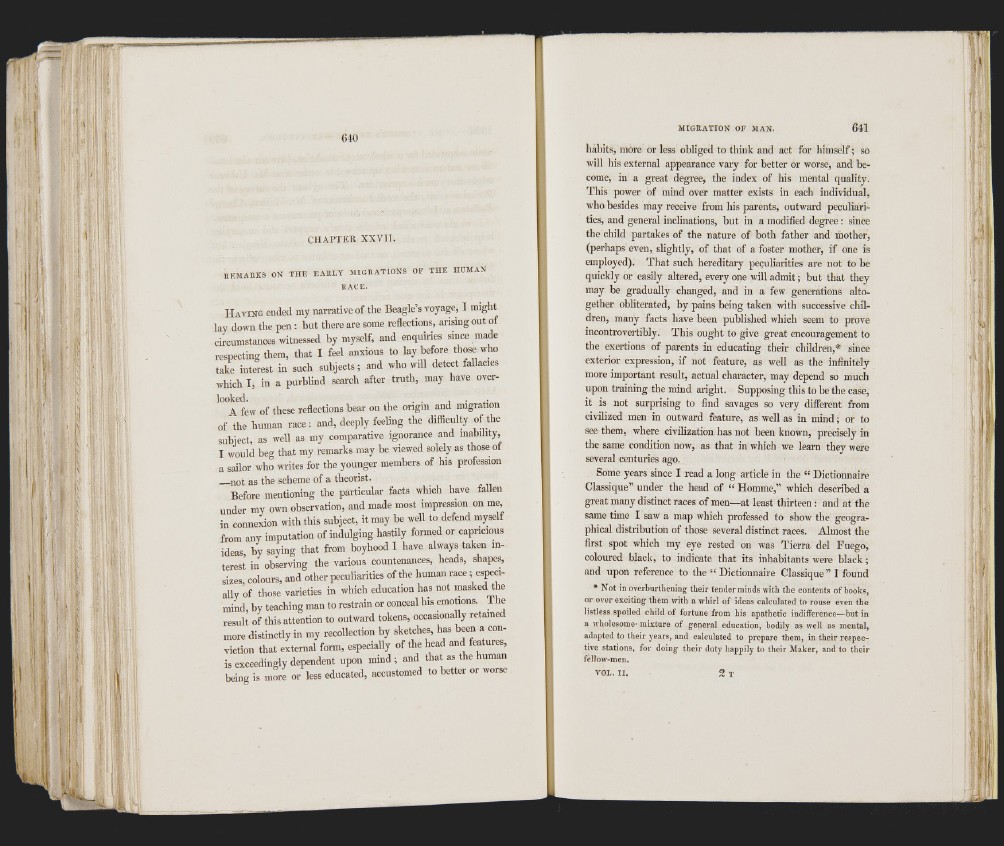
j . m
■ Z ' ï
CHAPTER XXVII.
REMAKES ON THE EARLY MIGRATIONS OF THE HUMAN
11 ACE.
H a v in g ended my narrative of the Beagle’s voyage, I might
lay down the pen : but there are some reflections, arising out of
circumstances witnessed by myself, and enquiries since made
respecting them, that I feel anxious to lay before those who
take interest in such subjects ; and who will detect fallacies
which I, in a purbbnd search after truth, may have overlooked.
, . , •
A few of tbese reflections bear on the origin and migration
of the human race; and, deeply feeling the difficulty of the
subject, as well as my comparative ignorance and inability,
I would beg that my remarks may be viewed solely as those of
a sailor wbo writes for the younger members of his profession
not as the scheme of a theorist.
Before mentioning the particular facts which have fallen
under my own observation, and made most impression on me,
in connexion with this subject, it may be well to defend myself
from any imputation of indulging hastily formed or capricious
ideas, by saying that from boyhood I have always taken interest
in observing the various countenances, beads, shapes,
sizes, colours, and other peculiarities of the human race ; especially
of those varieties in which education has not masked the
mind, by teaching man to restrain or conceal his emotions. The
result of this attention to outward tokens, occasionally retained
more distinctly in my recollection by sketches, has been a conviction
that external form, especially of the head and features,
is exceedingly dependent upon mind ; and that as the human
being is more or less educated, accustomed to better or worse
habits, more or less obliged to think and act for liimself ; so
will bis external appearance vary for better or worse, and become,
in a great degree, the index of his mental quality.
This power of mind over matter exists in each individual,
who besides may receive from his parents, outward peculiarities,
and general inclinations, but in a modified degree : since
the child partakes of the nature of both father and mother,
(perhaps even, slightly, of that of a foster mother, if one is
employed). That such hereditary peculiarities are not to be
quickly or easily altered, every one will admit ; but that they
may be gradually changed, and in a few generations altogether
obliterated, by pains being taken with successive children,
many facts have been published which seem to prove
incontrovertibly. This ought to give great encouragement to
the exertions of parents in educating their children,* since
exterior expression, if not feature, as well as the infinitely
more important result, actual character, may depend so much
upon training tbe mind aright. Supposing this to be the case,
it is not surprising to find savages so very different from
civilized men in outward feature, as well as in mind ; or to
see them, where civilization has not been known, precisely in
the same condition now, as that in which we learn they were
several centuries ago.
Some years since I read a long article in the “ Dictionnaire
Classique” under the head of “ Homme,” which described a
great many distinct races of men—at least thirteen : and at the
same time I saw a map which professed to show the geographical
distribution of those several distinct races. Almost the
first spot which my eye rested on was Tierra del Fuego,
coloured black, to indicate that its inhabitants were black ;
and upon reference to the “ Dictionnaire Classique” I found
* Not in overburthening their tender minds with the contents of books,
or over exciting them with a whirl of ideas calculated to rouse even the
listless spoiled child of fortune from his apathetic indifference—but in
a wholesome- mixture of general education, bodily as well as mental,
adapted to their years, and calculated to prepare them, in their respective
stations, for doing their duty happily to their Maker, and to their
fellow-men.
VOL. II .
It
¡5
Si
I*
«
- f
1 'f
u i
i ’i ir